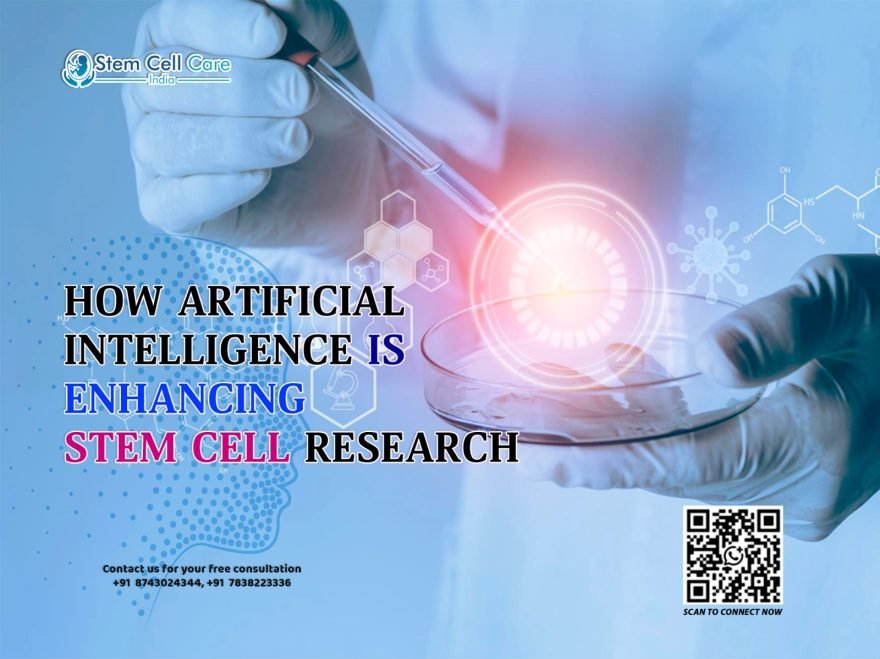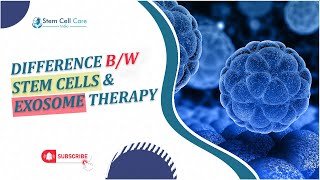Table of Contents
Summary:
Artificial intelligence is revolutionizing stem cell research around the globe. AI assists researchers in analysing massive amounts of data in the biological field quickly. It finds patterns that humans cannot easily detect. AI predicts how stem cells will grow and behave. This improves experiment design and saves significant time. Machine learning models enhance differentiation accuracy in regenerative studies. AI also improves quality control of cultured stem cells. It checks cell health and consistency in real time.
Healthcare AI-based tools assist in finding the cells that work best for therapy. They facilitate personalized treatment in the field of regenerative medicine. Mathematical models predict the therapeutic results before trials are conducted on patients. It decreases the trial-and-error procedures involved in drug development and discovery. AI simplifies the process and thus decreases the costs involved in research with optimized procedures and workflow protocols. Intelligent AI assists functions in the fields of image processing and pattern recognition.
AI aids in modelling complex biologizes accurately. It assists in stem cell response prediction based on varied conditions. More reliable predictions lead to more secure and more effective treatments. AI implementation encourages quicker discoveries of innovative stem cell treatments.
Technological advancements will bring increased AI power in the area of regenerative medicine. There is hope here for the treatment of incurable diseases. Scientists now have the ability to investigate possible cures more efficiently. “The integration of AI and stem cell technologies represents a paradigm shift. The marriage of computation and intelligence with the regenerative power of stem cell therapy represents an innovation era that brings together computational intelligence and the field of regenerative medicine.
FAQs:
1. What role does artificial intelligence play in stem cell research?
Artificial intelligence helps researchers analyse complex stem cell data fast. AI finds hidden patterns humans often miss. It predicts how stem cells behave under varied conditions. This speeds experiments and improves accuracy. AI also improves quality control of lab‑grown cells. It helps design better cell differentiation protocols. Machine learning models reduce errors in research outcomes. These tools improve efficiency in regenerative medicine studies.
2. How does AI improve stem cell therapy development?
AI predicts how stem cells will react to treatments. It tests many biological possibilities in virtual models. Algorithms identify optimal cell types for specific therapies. This reduces lab trial and error. AI analyses genetic and medical datasets precisely. It helps scientists tailor therapies for each patient’s condition. This customization can enhance treatment safety and effects. AI speeds development of advanced stem cell therapies.
3. Can AI help with cell differentiation accuracy?
Yes, AI enhances differentiation of stem cells into specific types. Machine learning models assess data from past experiments. They predict ideal growth environments for desired cell types. These predictions reduce trial‑and‑error cycles in labs. AI accelerates maturation of induced pluripotent stem cells. This improves disease modelling and therapy outcomes. Faster, accurate differentiation boosts regenerative medicine quality. It supports personalized medicine efforts worldwide.
4. Does AI help ensure stem cell quality control?
AI improves stem cell quality assessment methods. Algorithms analyse cell images to detect unwanted changes. Automated tools find subtle indicators of poor cell health. They detect contamination or differentiation issues early. This reduces risk before clinical use. Real‑time monitoring supports safer cell therapy production. AI supports consistent and reliable stem cell batches. Quality control becomes more precise and efficient overall.
5. How does AI accelerate stem cell research progress?
AI processes massive biological datasets rapidly. It detects trends faster than traditional manual methods. Researchers use AI to model complex signalling pathways. These models guide smarter experiment planning and design. AI simulates possible outcomes before physical testing begins. This saves significant lab time and expense. Discovery of cell behaviours becomes more predictable. AI enables more rapid advancement of regenerative medicine.
6. What future advances can AI bring to stem cell science?
AI will enhance disease‑specific stem cell solutions. It will tailor therapies based on genetic profiles. Predictive models will refine personalized treatment strategies. AI could automate routine lab tasks with robotics. These advancements improve consistency and reduce errors. Deep learning may unlock new therapeutic targets. Large data analysis can reveal unknown biological insights. Future integration of AI promises safer clinical applications. Regenerative medicine may see smarter breakthroughs ahead.
Conclusion:
Stem cell therapy and AI: this is a combination that is just incredible. Together, they are enabling scientists to unlock new avenues and enabling patients to reap the benefits of improved healing, reduced side effects, or more focused treatments. AI is enabling faster analysis, predictions, and accurate differentiation of cells. This combination is transforming experimental studies into reliable medical solutions. Patients now benefit from faster discoveries and safer therapies.
If you are considering stem cell therapy in Delhi, the time to do so has never been better. Artificial intelligence is making this formerly experimental science an ever more precise, potent, and personalized treatment than ever before. And with expert advice from the best in the field, such as Stem Cell Care India, you’re in good hands from start to finish. Dedicated professionals follow you from the evaluation to the end of treatment. Tailor-made treatment leads to greater success.
Additionally, AI integration helps researchers design safer clinical trials. It reduces risks and improves success rates of stem cell therapy. Real-time monitoring makes it possible to make changes in treatment to maximize results. Additionally, the impact of this technology is the reduction of the time needed to heal and the advancement of tissue regeneration. The marriage between AI and stem cell therapy is setting the future of regenerative medicine. Patients can look forward to new, efficient, and more reliable treatments.
Stem cell studies have long been regarded as having amazing promise, but with artificial intelligence (AI) now entering the equation, that promise is finally becoming a reality. Whether it’s predicting the action of stem cells or developing personalized treatment plans, AI is allowing scientists and doctors to make quicker, safer, and more accurate judgments than ever before.
If you are weighing stem cell treatment, especially in a developing hub like India, the advancements fueled by AI are something you should know about. They are changing the game for researchers and for patients and making stem cell treatment in Delhi nearer, more precise, and more potent. Let’s take a look at how AI is leading the charge.
How AI Supports and Supercharges Stem Cell Research
Artificial intelligence is not taking over for doctors or scientists but working alongside them to speed up breakthroughs and reduce error and trial. Here’s the backstage story:
Faster Cell Recognition
AI programming can quickly scan and identify different kinds of stem cells, such as mesenchymal cells, much faster than human researchers. This keeps labs free from contamination and ensures only health, viable cells are used in therapies.
Predicting Cell Behavior
The biggest challenge of stem cell therapy will be how a cell develops. AI models can review tons of biological data to predict whether the stem cell will become bone, nerve, or muscle tissue, thus increasing the focus of treatments.
Drug Testing and Discovery
Prior to any approval of a stem cell therapy, it must be tested. AI accelerates this by simulating how the drug and the stem cells may react—speeding up the process, saving money, and preventing human mistake.
Improved Patient Matching
AI allows doctors to pair patients with the optimal stem cell treatment protocols depending on medical history, genetics, and current health status. To patients considering stem cell therapy in Delhi, it translates to better success opportunities and reduced complications.
Enhancing Bone Marrow Therapies
Bone marrow transplants and treatments in conjunction with them are where AI technologies come in handy in terms of tracking progress, tracking immune responses, and warning of earlier signs of rejection, making operations more secure and recovery easier.
Tissue Engineering
The computer is able to help design tissue architecture by using mesenchymal cells, predict how to construct new tissues to repair organs, cartilage, or even skin—in the lab.
Where to Turn for Expert Guidance?
If you are looking for stem cell treatment in Delhi and want a trustworthy team to guide you, Stem Cell Care India is a suitable option. They offer expert consultancy and support for patients thinking about regenerative therapy—ranging from bone marrow disorders to degenerative conditions. Their services combine cutting-edge research with empathetic care, supporting individuals through their recovery processes with confidence and clarity.
Epilogue
Stem cell therapy and artificial intelligence constitute an impressive combination. They are collectively empowering researchers to find new paths and allowing patients to experience better outcomes, whether through enhanced recuperation, minimized side effects, or more targeted treatments.
If you are considering stem cell therapy in Delhi, the time to do so has never been better. AI is making this once-experimental science a more accurate, more powerful, and more personalized treatment than ever before. And with expert advice from renowned names like Stem Cell Care India, you’ll be in good hands every step of the way.
Reference Links:
- NIH – AI for Quality Control of Stem Cell–Derived Tissues
Artificial intelligence improves quality assessment of therapeutic stem cell tissues. https://www.nih.gov/news-events/news-releases/nih-nist-researchers-use-artificial-intelligence-quality-control-stem-cell-derived-tissues
- Smarter stem cells: how AI is supercharging iPSC technology (Springer)
AI enhances induced pluripotent stem cell (iPSC) research and regenerative medicine. https://link.springer.com/article/10.1007/s00441-025-03999-7\
- Artificial intelligence and improvement of stem cell delivery
AI improves stem cell delivery and efficacy in healthcare research.
https://www.ejgm.co.uk/article/artificial-intelligence-and-improvement-of-stem-cell-delivery-in-healthcare-13383
- Artificial Intelligence in Stem Cell Research – New Insights
AI analyzes complex stem cell data and accelerates discovery. https://nbscience.com/artificial-intelligence-in-stem-cell-research-new-insights-and-discoveries/
- Artificial-Intelligence-Based Imaging Analysis of Stem Cells (PeerJ)
AI improves imaging and classification in stem cell studies. https://peerj.com/articles/10346/













